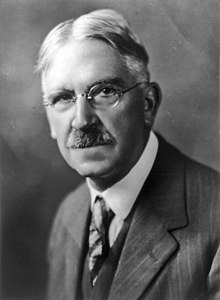
Back John Dewey Afrikaans جون ديوي Arabic جون ديوى (فيلسوف) ARZ John Dewey AST Con Dyui Azerbaijani جان دیویی AZB Джон Дзьюі Byelorussian Джон Дюи Bulgarian জন ডুয়ি Bengali/Bangla John Dewey BS
John Dewey | |
|---|---|
 | |
| Born | October 20, 1859 Burlington, Vermont, U.S. |
| Died | June 1, 1952 (aged 92) New York City, New York, U.S. |
| Alma mater | University of Vermont Johns Hopkins University |
| Children | 6, including Jane and Evelyn Dewey |
| Era | 20th-century philosophy |
| Region | Western philosophy |
| School | Pragmatism Instrumentalism[1] Functional psychology Process philosophy[2][3][4] |
| Institutions | |
| Doctoral students | Hu Shih, Tao Xingzhi,[5] Feng Youlan, Jiang Menglin, Lin Mosei |
Main interests | Philosophy of education, epistemology, journalism, ethics, aesthetics, political philosophy, metaphysics |
Notable ideas | Reflective thinking[6] Functional psychology Immediate empiricism Inquiry into Moscow show trials about Trotsky Educational progressivism Occupational psychosis |
John Dewey (/ˈduːi/; October 20, 1859 – June 1, 1952) was an American philosopher, psychologist, and educational reformer. He was one of the most prominent American scholars in the first half of the twentieth century.[7][8]
The overriding theme of Dewey's works was his profound belief in democracy, be it in politics, education, or communication and journalism.[9] As Dewey himself stated in 1888, while still at the University of Michigan, "Democracy and the one, ultimate, ethical ideal of humanity are to my mind synonymous."[10] Dewey considered two fundamental elements—schools and civil society—to be major topics needing attention and reconstruction to encourage experimental intelligence and plurality. He asserted that complete democracy was to be obtained not just by extending voting rights but also by ensuring that there exists a fully formed public opinion, accomplished by communication among citizens, experts, and politicians.
Dewey was one of the primary figures associated with the philosophy of pragmatism and is considered one of the founding thinkers of functional psychology. His paper "The Reflex Arc Concept in Psychology", published in 1896, is regarded as the first major work in the (Chicago) functionalist school of psychology.[11] A Review of General Psychology survey, published in 2002, ranked Dewey as the 93rd-most-cited psychologist of the 20th century.[12]
Dewey was also a major educational reformer for the 20th century.[7] A well-known public intellectual, he was a major voice of progressive education and liberalism.[13][14] While a professor at the University of Chicago, he founded the University of Chicago Laboratory Schools, where he was able to apply and test his progressive ideas on pedagogical method.[15][16] Although Dewey is known best for his publications about education, he also wrote about many other topics, including epistemology, metaphysics, aesthetics, art, logic, social theory, and ethics.
- ^ Cite error: The named reference
IEPwas invoked but never defined (see the help page). - ^ "Process Philosophy". The Stanford Encyclopedia of Philosophy. Metaphysics Research Lab, Stanford University. 2021. Archived from the original on January 21, 2022. Retrieved November 28, 2021.
- ^ "Dewey, John | Internet Encyclopedia of Philosophy". Archived from the original on November 28, 2021. Retrieved November 28, 2021.
- ^ Myers, William T. (2019). "Dewey, Whitehead, and Process Metaphysics". In Fesmire, Steven (ed.). The Oxford Handbook of Dewey. pp. 52–72. doi:10.1093/oxfordhb/9780190491192.013.3. ISBN 978-0-19-049119-2. Archived from the original on November 28, 2021. Retrieved November 28, 2021.
- ^ 于其多. "和胡适同为留洋博士、师从杜威,为什么陶行知成了中国人民教育家". 上观新闻. Archived from the original on June 3, 2023. Retrieved March 11, 2023.
- ^ John Dewey, How we think (1910), p. 9.
- ^ a b "PBS Online: Only A Teacher: Schoolhouse Pioneers". www.pbs.org. Archived from the original on February 23, 2021. Retrieved August 29, 2019.
- ^ Hildebrand, David (2018), "John Dewey", in Zalta, Edward N. (ed.), The Stanford Encyclopedia of Philosophy (Winter 2018 ed.), Metaphysics Research Lab, Stanford University, archived from the original on March 8, 2021, retrieved August 29, 2019
- ^ Festenstein, Matthew (2018), "Dewey's Political Philosophy", in Zalta, Edward N. (ed.), The Stanford Encyclopedia of Philosophy (Fall 2018 ed.), Metaphysics Research Lab, Stanford University, archived from the original on March 8, 2021, retrieved August 29, 2019
- ^ Early Works, 1:228 (Southern Illinois University Press) op cited in Douglas R. Anderson, AAR, The Journal of the American Academy of Religion, Vol. 61, No. 2 (1993), p. 383
- ^ Backe, Andrew (1999). "Dewey and the Reflex Arc: The Limits of James's Influence". Transactions of the Charles S. Peirce Society. 35 (2): 312–326. ISSN 0009-1774. JSTOR 40320763.
- ^ Haggbloom, Steven J.; Warnick, Renee; Warnick, Jason E.; Jones, Vinessa K.; Yarbrough, Gary L.; Russell, Tenea M.; Borecky, Chris M.; McGahhey, Reagan; Powell, John L. III; Beavers, Jamie; Monte, Emmanuelle (2002). "The 100 most eminent psychologists of the 20th century". Review of General Psychology. 6 (2): 139–52. CiteSeerX 10.1.1.586.1913. doi:10.1037/1089-2680.6.2.139. S2CID 145668721. Archived from the original on October 3, 2018. Retrieved June 9, 2015.
- ^ Alan Ryan, John Dewey and the High Tide of American Liberalism, (1995), p. 32
- ^ Violas, Paul C.; Tozer, Steven; Senese, Guy B. (September 2004). School and Society: Historical and Contemporary Perspectives. McGraw-Hill Humanities/Social Sciences/Languages. p. 121. ISBN 978-0-07-298556-6.
- ^ "John Dewey's Laboratory School in Chicago". www.mi-knoll.de. Archived from the original on November 23, 2021. Retrieved August 29, 2019.
- ^ "John Dewey (1859—1952)". The University of Tennessee at Martin. Archived from the original on August 24, 2019. Retrieved August 29, 2019.